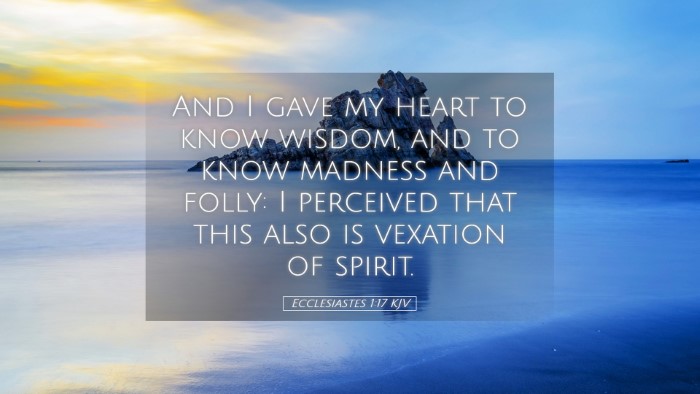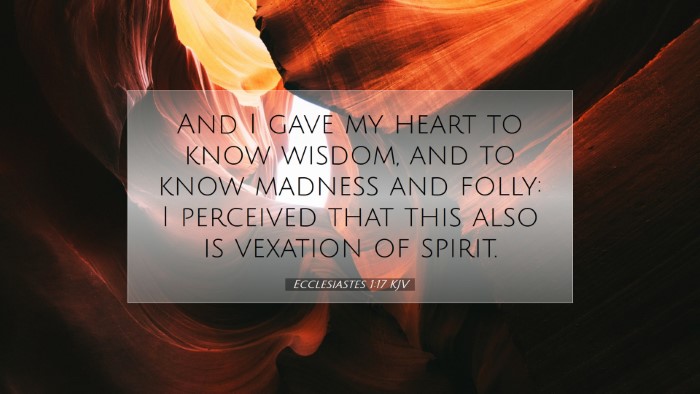Commentary on Ecclesiastes 1:17
Verse: "And I set my heart to know wisdom and to know madness and folly; I perceived that this also is but a striving after wind."
Introduction
The Book of Ecclesiastes, attributed to Solomon, delves into the complexities of human experience and the pursuit of wisdom. In Ecclesiastes 1:17, we encounter a critical reflection on the nature of knowledge and indulgence in folly. This verse serves as a pivotal insight into the futility often embedded in human pursuits when divorced from a deeper understanding.
Exegesis of Ecclesiastes 1:17
This verse highlights the author's quest for wisdom and understanding in various aspects of life, emphasizing a contrast between true wisdom and the madness and folly that often accompany human pursuits.
Wisdom, Madness, and Folly
Solomon expresses a profound desire to grasp the essence of wisdom, evaluating both wisdom and its antitheses—madness and folly. Matthew Henry notes that wisdom here refers not only to intellectual insight but also practical understanding, suggesting a holistic approach to knowledge.
Henry points out that despite the pursuit of wisdom, one cannot escape the chaos of human reasoning, which leads to a realization of the vanity in these pursuits. Albert Barnes elaborates further, indicating that wisdom can provide clarity, yet pathworks in madness and folly add confusion to human existence. This duality highlights the complexity of human ambition against the backdrop of divine sovereignty.
Perceived Futility
As the author reflects, "I perceived that this also is but a striving after wind," it encapsulates the theme of futility present throughout Ecclesiastes. Adam Clarke emphasizes that the phrase "striving after wind" is a poignant metaphor indicating that certain objectives and pursuits, despite appearing significant, are ultimately inconsequential.
Clarke argues that the instability of wisdom without God leads to a sense of emptiness, illustrating a spiritual dimension that transcends mere intellectual attainment. He notes that true wisdom should be grounded in a reverence for God, where human understanding recognizes its limitations.
The Significance of Pursuing Wisdom
In grappling with wisdom's value and its apparent limitations, this verse discerns how the pursuit of wisdom, when isolated from a relationship with the divine, can mislead individuals into the shadows of madness and folly.
Spiritual Implications
The quest for wisdom should not only seek knowledge for personal gain but also encompass an understanding of God's creation. As outlined by Henry, gusts of folly can ensnare the unwary, diverting them from contemplative practices that lead to spiritual truths. This pursuit is not merely intellectual but existential, guiding the seeker to recognize the overarching purpose in life beyond temporal pursuits.
Barnes highlights that the wisdom derived from experiencing and discerning madness often awakens the spirit to a greater reality—an acknowledgment of one's social and spiritual responsibilities. Thus, spiritual wisdom entails the ability to balance one's aspirations with humility and awareness of divine providence.
Application for Believers
For pastors and theologians, this verse serves as a call to emphasize the necessity of integrating wisdom with spiritual understanding in sermon delivery and theological education. It encourages the recognition of folly in worldly pursuits while promoting a biblical framework for wisdom—rooted in a relationship with God.
Students of Scripture are invited to engage deeply with the text, contemplating how contemporary society often mirrors the fleeting pursuits of the past. It challenges one to navigate life by seeking wisdom through prayer and the exploration of biblical truths that lead to genuine fulfillment.
Conclusion
In conclusion, Ecclesiastes 1:17 serves as a profound admonition against the hollow pursuits of wisdom and knowledge if carried out without consideration of God's purposes. The insights derived from the commentaries of Matthew Henry, Albert Barnes, and Adam Clarke converge to elucidate the futility inherent in human understanding when it neglects a divine foundation.
The quest for wisdom must ultimately be aligned with the knowledge of who God is and our place in His creation. Such an understanding will not only enrich our lives but will also illuminate the path toward a meaningful existence, avoiding the snares of madness and folly.


